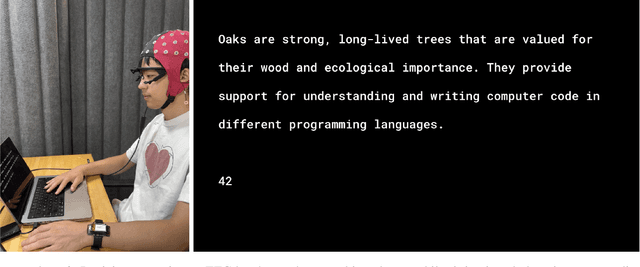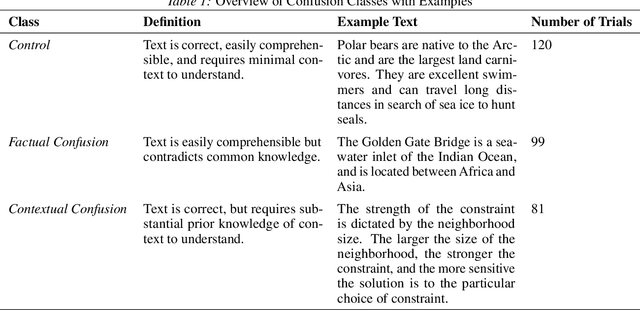Nataliya Kosmyna
Detecting Reading-Induced Confusion Using EEG and Eye Tracking
Aug 20, 2025



Abstract:Humans regularly navigate an overwhelming amount of information via text media, whether reading articles, browsing social media, or interacting with chatbots. Confusion naturally arises when new information conflicts with or exceeds a reader's comprehension or prior knowledge, posing a challenge for learning. In this study, we present a multimodal investigation of reading-induced confusion using EEG and eye tracking. We collected neural and gaze data from 11 adult participants as they read short paragraphs sampled from diverse, real-world sources. By isolating the N400 event-related potential (ERP), a well-established neural marker of semantic incongruence, and integrating behavioral markers from eye tracking, we provide a detailed analysis of the neural and behavioral correlates of confusion during naturalistic reading. Using machine learning, we show that multimodal (EEG + eye tracking) models improve classification accuracy by 4-22% over unimodal baselines, reaching an average weighted participant accuracy of 77.3% and a best accuracy of 89.6%. Our results highlight the dominance of the brain's temporal regions in these neural signatures of confusion, suggesting avenues for wearable, low-electrode brain-computer interfaces (BCI) for real-time monitoring. These findings lay the foundation for developing adaptive systems that dynamically detect and respond to user confusion, with potential applications in personalized learning, human-computer interaction, and accessibility.
Your Brain on ChatGPT: Accumulation of Cognitive Debt when Using an AI Assistant for Essay Writing Task
Jun 10, 2025Abstract:This study explores the neural and behavioral consequences of LLM-assisted essay writing. Participants were divided into three groups: LLM, Search Engine, and Brain-only (no tools). Each completed three sessions under the same condition. In a fourth session, LLM users were reassigned to Brain-only group (LLM-to-Brain), and Brain-only users were reassigned to LLM condition (Brain-to-LLM). A total of 54 participants took part in Sessions 1-3, with 18 completing session 4. We used electroencephalography (EEG) to assess cognitive load during essay writing, and analyzed essays using NLP, as well as scoring essays with the help from human teachers and an AI judge. Across groups, NERs, n-gram patterns, and topic ontology showed within-group homogeneity. EEG revealed significant differences in brain connectivity: Brain-only participants exhibited the strongest, most distributed networks; Search Engine users showed moderate engagement; and LLM users displayed the weakest connectivity. Cognitive activity scaled down in relation to external tool use. In session 4, LLM-to-Brain participants showed reduced alpha and beta connectivity, indicating under-engagement. Brain-to-LLM users exhibited higher memory recall and activation of occipito-parietal and prefrontal areas, similar to Search Engine users. Self-reported ownership of essays was the lowest in the LLM group and the highest in the Brain-only group. LLM users also struggled to accurately quote their own work. While LLMs offer immediate convenience, our findings highlight potential cognitive costs. Over four months, LLM users consistently underperformed at neural, linguistic, and behavioral levels. These results raise concerns about the long-term educational implications of LLM reliance and underscore the need for deeper inquiry into AI's role in learning.
NeuroChat: A Neuroadaptive AI Chatbot for Customizing Learning Experiences
Mar 10, 2025



Abstract:Generative AI is transforming education by enabling personalized, on-demand learning experiences. However, AI tutors lack the ability to assess a learner's cognitive state in real time, limiting their adaptability. Meanwhile, electroencephalography (EEG)-based neuroadaptive systems have successfully enhanced engagement by dynamically adjusting learning content. This paper presents NeuroChat, a proof-of-concept neuroadaptive AI tutor that integrates real-time EEG-based engagement tracking with generative AI. NeuroChat continuously monitors a learner's cognitive engagement and dynamically adjusts content complexity, response style, and pacing using a closed-loop system. We evaluate this approach in a pilot study (n=24), comparing NeuroChat to a standard LLM-based chatbot. Results indicate that NeuroChat enhances cognitive and subjective engagement but does not show an immediate effect on learning outcomes. These findings demonstrate the feasibility of real-time cognitive feedback in LLMs, highlighting new directions for adaptive learning, AI tutoring, and human-AI interaction.
 Add to Chrome
Add to Chrome Add to Firefox
Add to Firefox Add to Edge
Add to Edge